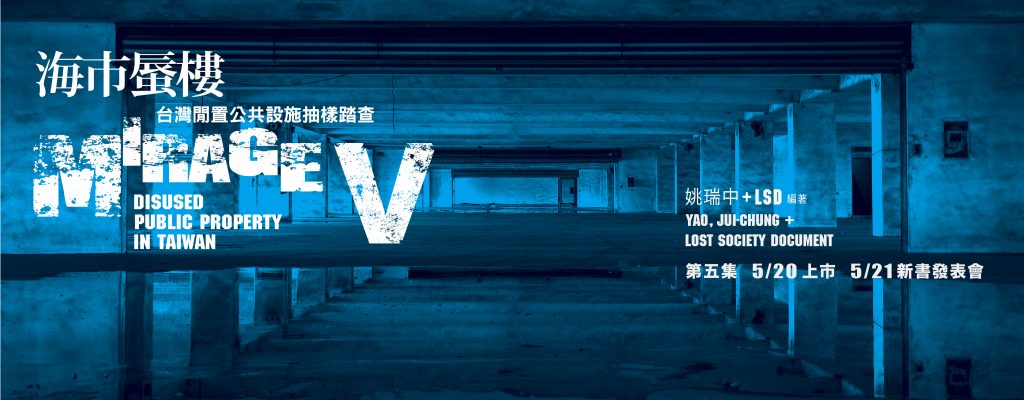For English, please scroll down.
時間:2016.05.21(六),3 – 4:30pm
地點:台北當代藝術中心,台北市保安街49巷11號(捷
主講人:姚瑞中
座談來賓:羅秀芝導演、黃瑞茂老師、林三加律師、呂岱如
自2010年專書連續出版以來,五集總共收錄了五百處以
面對債留子孫、高齡社會、少子女化及貧富差距加劇的台灣
主講者:
姚瑞中,1969年生於台灣台北,1994年國立台北藝
Time: 2016.05.21 (Sat), 3 – 4:30pm
Venue: Taipei Contemporary Art Center, No. 11, Lane 49, Baoan Street, Taipei (MRT: Daqiaotou Station)
Speaker: Yao Jui-Chung
In conversations with: Director Lo Hsiu-chih, Professor Huang Jui-Mao, Lawyer Lin San-Chia, Curator Esther Lu and students participated in Lost Society Document for this volume
Since the first volume of Mirage was published in 2010, the series has documented more than five hundred disused public properties in five volumes. More than half of the listed cases in the series refer to the so-called “mosquito pavilions” in Taiwan, namely those ill-maintained historical buildings, abandoned heritage sites, dysfunctional spaces emerged in the process of social structural changes, such as disused elementary schools, military facilities, inoperative markets, etc. There are more unused new buildings that are generated due to many excessively elevated campaign promises by politicians, optimistic development planning, ignorance about the urbanization shifts and certainly corruptions. Many cases have been reported by media and the Mirage series, and the government is alerted to start managing some of them. From the reaction, we can see the related government sectors are still not fully aware of their own properties and management responsibilities. Despite there are new administrative regulations to report and manage the local public properties and new allocation of budget and human resource to support operation systems, there are still quite many different problems occurred in these reactivation schemes. In a summarized analysis, the existing closed-door reactivation, superficial reactivation and passive reactivation approaches of developmentalism and market economy mind-set extend the questions to considerations for spatial transformation and land justice.
The current Taiwanese society faces critical challenges of public debt, the aging society and the declining birth rate, and the minority and young generation are going to be further deprived in the coming years. All empty “mosquito pavilions” are going to be the most ironic gravestones that the government leaves for the powerless citizens.
About Speaker:
Yao Jui-Chung was born in 1969. Lives and works in Taipei. He graduated from The National University of the Arts. His works has been widely exhibited in numerous international exhibitions. Include Venice, Yokohama, APT 6, Taipei, Shanghai, Beijing, Shenzhen, Media City Seoul, Manchester, Asia and Sydney Biennale/Triennale. Yao is the winner of The Multitude Art Prize in 2013 and 2014 Asia pacific Art Prize. Yao specializes in photography, installation, and painting. The themes of his works are varied, but most importantly they all examine the absurdity of the human condition. In recent years, he has created photo installations combining the style of “gold and green landscape” with the superstitions that permeate Taiwanese folklore, expressing a false and alienated “cold reality” that is specific to Taiwan. Representative works. Since 2010, Yao grouped his students into a team of photography workshop called “”Lost Society Document” “(LSD), published five books named “”Mirage: Disused Public Property in Taiwan”,” and practice looked into the possibility of observing the society by through the meaning of art.

